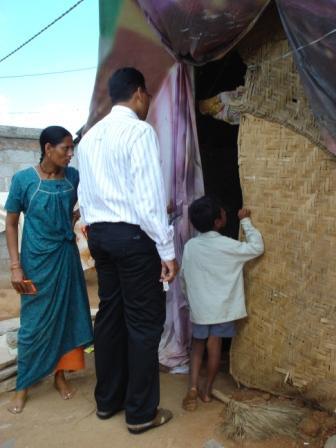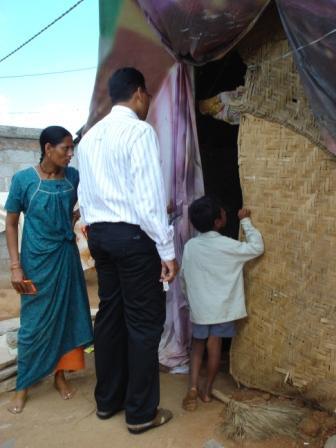
A great deal has been written about the opportunities and challenges faced by community health workers (CHWs) in the context of LMICs, including India. However, the specific struggles of frontline TB workers (FTWs)—who are equally close to the community—are either overlooked or barely addressed in these discussions. In this article, we’d like to discuss one of their main concerns, while also pointing to a way forward. It is imperative to recognize their contributions and ensure they receive the attention and support they deserve.
The ‘health workforce’ is one of the crucial building blocks of the health systems framework. In India, the National TB Elimination Program (NTEP) depends significantly on FTWs for the implementation of policies aimed at TB control and treatment. They consist of contract staff, including a Senior Treatment Supervisor (STS), Senior Tuberculosis Laboratory Supervisor (STLS), and TB Health Visitor (TBHV). FTWs act as a vital link between the public and private health systems, as well as between patients and healthcare facilities.
Over a decade ago now, my (i.e. Solomon’s) doctoral research (2009-2014), conducted under the invaluable supervision of Prof. John Porter, highlighted that FTWs were demoralized due to bureaucratic pressures and constantly changing program policies. They were neglected in terms of adequate staffing and financial resources. The lack of recognition, coupled with job insecurity, left them in a state of constant fear. Despite these challenges, FTWs continued to function in resource-limited settings. Over the years, John and I occasionally talked about these concerns, but most recently (i.e. thirteen years after my PhD fieldwork), I went to one of the states for some other fieldwork. The question on my mind: Did anything change?
A Conversation That Sparked Reflection
One conversation in particular stayed with me last year, during my visit to one of the states in India, as part of my consultancy work. While there, I participated in a week-long training program organized for FTWs. The purpose was to evaluate the training program and provide insights for NTEP’s modernized training system. My role as a researcher coming from an anthropology background involved observations, informal interactions, and interviews with both organizers and participants. One afternoon, during lunch, I joined a group of 10-12 STLSs at a table. While my initial intention was to gather their informal feedback on the modernized training system, our conversation revealed deeper concerns.
[Excerpt from Field Diary, Friday, September 20, 2024]
During lunch, I had an informal interaction with 10-12 STLSs . To start the conversation, I asked how they viewed their role in achieving the TB elimination goal. One of them responded bluntly, “TB elimination means loss of job.” Before I could react, another added, “The government should do something for our job security. We are also doing our work…”
A few days later, during a telephonic interview, an STLS expressed a similar concern:
“Sir, to tell you the truth, this is not just my opinion but the collective opinion of my colleagues (such as STS and TBHV) and friends from other districts as well. We are worried and tense. After TB is eliminated, what will happen to our jobs and careers? We have no security, sir.”
— Interview, STLS – 8, 2024
Their words took me 13 years back to my PhD fieldwork, when I had encountered similar anxieties among frontline workers. I retrieved an old quote from my laptop:
“…I am unable to see my future in this [TB] program. There is always a fear of losing our job. What is the use of doing so much work here? We dedicate our time, perform risky tasks, and still we are in a state of constant fear…”
— Interview, Lab Technician-3, 2011
Comparing these two moments, I realized that while the nature of the TB program has evolved, the frontline workers’ fear and uncertainty have remained constant. Thirteen years ago, their concerns stemmed from the contractual nature of their work. Today, this insecurity is compounded by the looming prospect of TB elimination itself.
Compassion in health systems should also include compassion for FTWs
What can be done about their (continued) anxiety? Perhaps a broader interpretation of a compassionate health system could provide part of the answer.
Compassion is the deep awareness of another’s suffering, coupled with a genuine desire to alleviate it. It goes beyond sympathy or empathy by driving action to support and uplift those in distress. It is a fundamental human value that fosters connection, well-being, and ethical decision-making in both personal and professional settings.
It is ironic that while the goal for TB elimination represents a significant public health victory, it also introduces uncertainty for those who work tirelessly towards this goal. Little attention has been given to the physical, economic, and mental well-being of frontline workers. The system often treats them as mere cogs in a machine, engaging with them in a transactional rather than a human-centred manner. Despite coming from the same communities as the so-called “beneficiaries,” they are not regarded in the same way.
Compassion towards, and the lived experiences of frontline health workers continue to be overlooked in global health discourse. Conversations about compassion typically center on “patients”, or those who seek care at health centers, but rarely extend to the workers who implement these programs. As a reminder, the World Health Organization (WHO) defines health as “a state of complete physical, mental, and social well-being, not just the absence of disease or infirmity.” While words like compassion, love, kindness, and joyfulness may seem spiritual in nature, they play a crucial role in mental and emotional well-being. Yet, they remain absent from the rigid, top-down policy implementation processes in public health.
Public health researchers are increasingly recognizing that health systems are more than just technical frameworks—they encompass both ‘hardware’ (infrastructure, funding, policies) and ‘software’ (relationships, values, motivation). It is encouraging that compassion is now being recognized within the WHO framework for quality in universal health coverage. The Focus Area for Compassion and Ethics (FACE), a program of The Task Force for Global Health, strives to emphasize the role of compassion and ethics in everyday global health practices. As Prof. David Addiss has aptly emphasized, ‘Global health is rooted in the value of compassion‘. However, the key challenge is how to embed these values into institutional structures in a way that makes them actionable and sustainable. A compassionate health system is one that not only prioritizes patient care but also ensures mental and emotional well-being of its workforce by providing job security, recognition, adequate resources, clear communication, and sustained motivation.
Conclusion
FTWs are essential to achieving India’s TB elimination goals. However, their persistent fear and uncertainty need urgent redress within policy frameworks. If global health systems truly aim to be robust and effective, they must integrate compassion—not just as a moral ideal, but as an operational principle guiding everyday decision-making and policy implementation. If compassion is not integrated into implementation strategies, health workers may struggle to function effectively, reinforcing their state of fear and insecurity.
——
Acknowledgment: Deep gratitude to Prof. David Addiss, whose pioneering work on compassion in global health—and his thoughtful conversations with Solomon on a couple of occasions—have been a profound source of inspiration for this article.

Frontline TB worker visits a patient’s home for a follow-up (picture by first author)